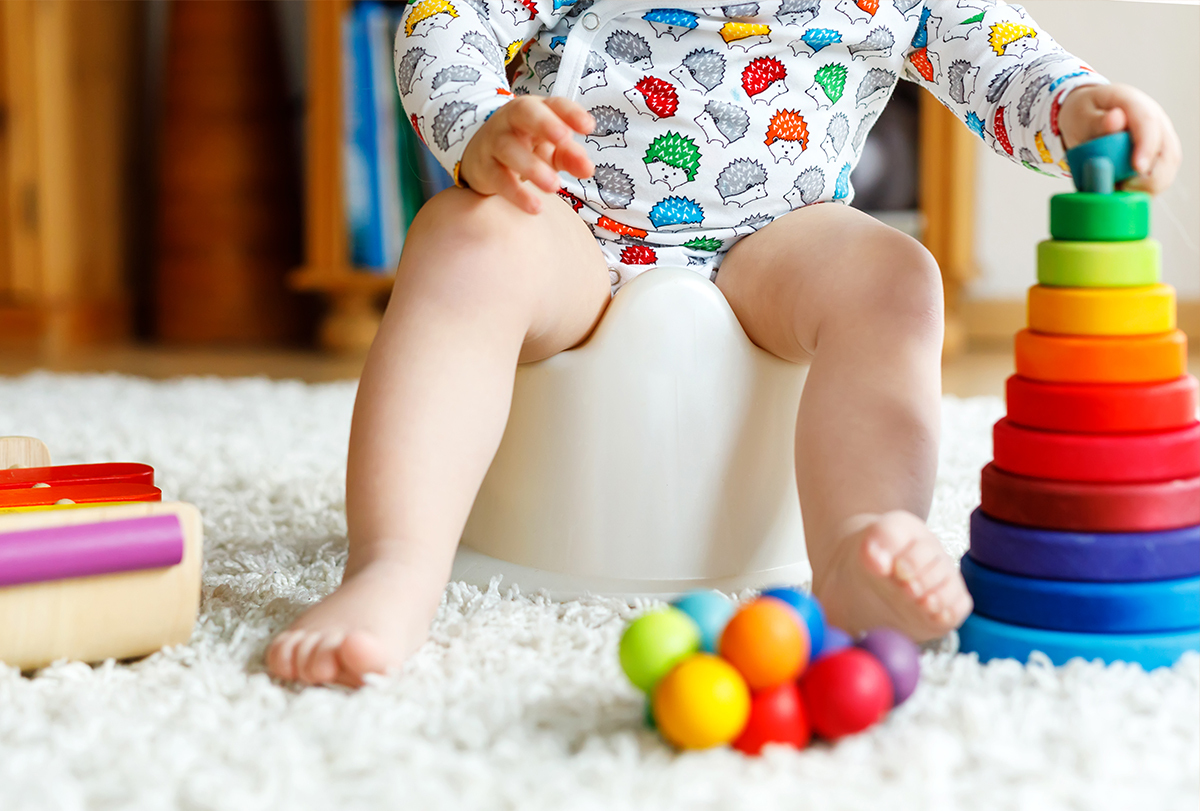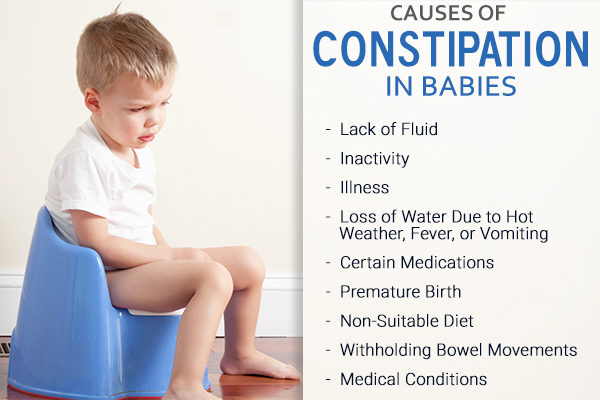In this article:
An important indication of your baby’s healthy development is the change in their bowel movements when switching from breastmilk to formula, a semisolid, or solid food diet.

This happens due to an increase in the amounts of nutrients that require more time to be absorbed by the intestines, thus widening the gap between defecations.
Constipation is characterized by irregular and hard-to-pass bowel movements for more than 2 weeks. It may cause irritation and discomfort to the baby. However, constipation is mostly a common, natural phenomenon.
Normal Bowel Movements
The healthiness of the digestive system of babies is indicated by regularity and consistency in bowel movements rather than the frequency.
- Breastfed newborns: Generally, they excrete after every feed up to 1 month of age and have yellower, runny, or pasty stools.
- Formula-fed newborns: They may have around five bowel movements daily in the first week, which gradually decreases to two defecations by the end of the first month.
- Infants: Two- to three-month-old babies can have one or two stools each day or even one bowel movement in a week.
As the child grows, their daily defecations decrease progressively to one to two by the time they turn four. Therefore, normal bowel movements vary with age and development. (1)
What Causes Constipation?
It is common for toddlers to get constipated during the following events:
- Starting processed foods or formula
- Potty training
- Starting school

The following factors contribute to constipation in toddlers:
- Lack of fluid
- Inactivity
- Illness
- Loss of water due to fever, hot weather, or vomiting
- Medications
- Premature birth
- Non-suitable diet
- Withholding (functional constipation)
- Medical conditions such as food allergy, Hirschsprung’s disease, hyperthyroidism, coeliac disease, and some metabolic disorders
Signs and Symptoms of Constipation
The following symptoms may be indicative of constipation in your child:
- Dry, smelly, and firm stools
- Irregular bowel movements
- Painful defecation
- Tight belly
- Blood in the stool, toilet paper, or diaper
- Fecal impaction, which is characterized by spots of liquids or stool in the child’s underwear due to involuntary leakage
- Not more than three defecations in a week in infants
- Excessive spitting up by neonates
- Irritability and refusal to eat
- Difficulty in passing stool
- Anal fissures
Newborn children often strain during bowel movements due to weak abdominal muscles. While this is normal, it may be indicative of constipation if accompanied by pain, crying, or a taut belly.
Treatment Options
After a careful diagnosis, the doctor will suggest a suitable treatment plan according to the child’s age, which may include:
- Laxatives: Medicines that soften the stool or add weight to it
- Stimulants: Drugs that boost the activity of the gut, increasing the bowel movement
- Disimpaction therapy: Treatment that involves clearing of the gut in one week
If the condition is persistent after standard or prescribed treatments, it is recommended to consult a specialist, such as a pediatric gastroenterologist, at the earliest.
Prolonged constipation might cause discomfort to your baby and should not be overlooked.
Diagnosing Constipation

It is recommended to seek medical help if your baby has prolonged constipation or related symptoms. The condition may be diagnosed after:
- Physically examining the child, which may include a rectal exam
- Evaluating the child’s dietary and bowel routines
- Studying the child’s medical history
Organic causes of constipation are identified with the help of diagnostic tests. On the other hand, functional constipation, the most common diagnosis for toddlers over 1 year, can be confirmed by studying the child’s medical history.
Complications Associated With Constipation
Constipation may become chronic if left untreated for long. In rare cases, this condition may lead to complications such as:
- Rectal prolapse
- Anal fissures
- Fecal impaction
When to See a Doctor
For babies up to 2 months old, medical help should be taken if they are not gaining proper weight or haven’t had any bowel movement in 2–3 days.
Irregular or infrequent bowel movements in newborns up to two weeks old is especially a source of concern. This may result from insufficient calorie intake and indicates poor growth. Therefore, it is vital to check with your pediatrician for a feeding assessment.
Moreover, visit a doctor for all cases of constipation in infants less than 1-year-old. Meanwhile, it is recommended to get your toddler checked if constipation is accompanied by:
- Fever
- Inactivity or lethargy
- Lack of appetite
- Vomiting
- The stomach has swollen with gas
- Blood in the stool
- No bowel movement for 3 days or more
Expert Answers (Q&A)
Answered by Candice W. Jones, MD, FAAP
Every baby is different as to how often they will poop. The focus should be on stool consistency, which is hard in constipation. Normally, there is no need to worry if your baby skips a couple of days but still has soft stools.
Breastfed babies tend to poop more often than formula-fed babies because breast milk is more easily digested. Formula-fed babies may skip days pooping but if the stool is soft, there is no need to worry.
Gently pressing in the abdomen, pushing the legs to the chest, or cycling the legs are all techniques used to promote stooling in babies. They are harmless and most parents find them useful to help the baby pass stool.
Gripe water is safe for use. However, there is no evidence to support its efficacy in relieving conditions such as constipation. (2)
Similarly, the evidence is limited to support probiotic use in infants. Therefore, discuss with your doctor before using them. (3)
Moreover, water is not recommended during the early infancy period because of its lack of calories and nutrients.
It is important for moms to maintain a healthy diet and adequate hydration to support successful breastfeeding. Constipation is uncommon in solely breastfed babies. If it occurs, it is likely due to the introduction of solids or formula.
The doctor may recommend a small amount of prune or pear juice, a little Karo syrup, a different formula, or a pediatric glycerin suppository, but check with them first to know if your baby is truly constipated.
Teething is not likely to cause constipation in babies. Most babies do well with teething and continue to eat, drink, and be happy.
Final Word
Parents may easily get worried if their baby gets constipated. However, a rise in efforts for a smooth bowel movement is indicative of the healthy development of the baby’s digestive system. If the condition does not resolve in 3 days, consult a doctor.

- Was this article helpful?
- YES, THANKS!NOT REALLY


